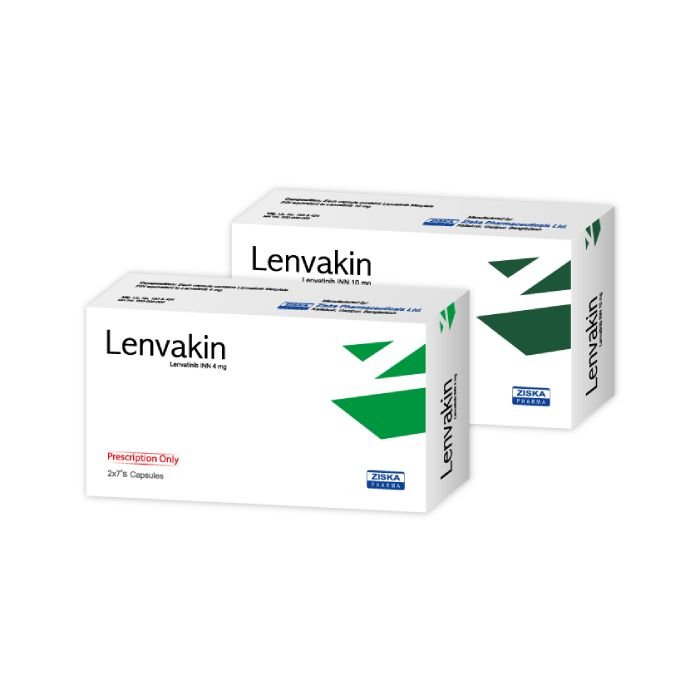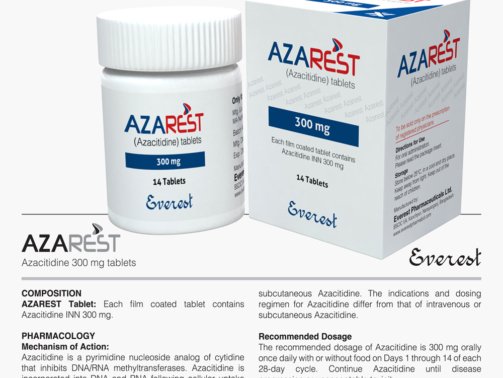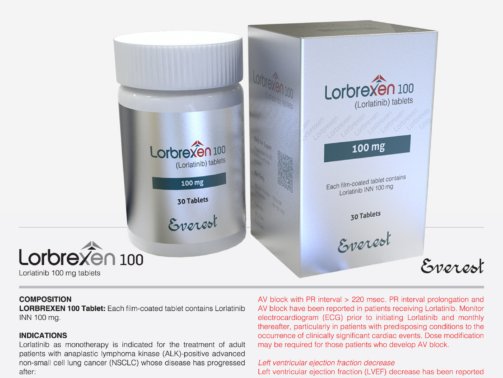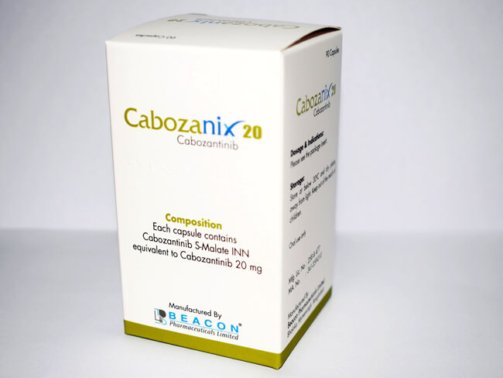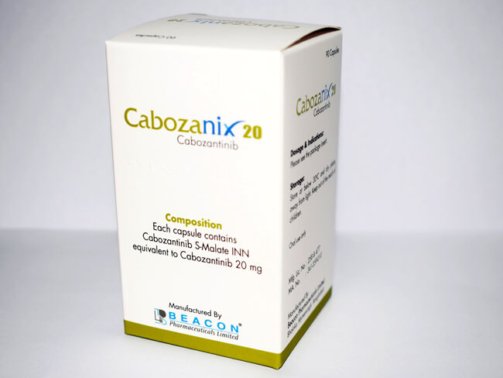Lenvatinib 10 mg (Lenvima)
0.00$
Lenvakin (Lenvatinib) 10 mg is a medication used in the treatment of various cancers, including thyroid cancer and hepatocellular carcinoma (HCC). It belongs to a class of drugs known as receptor tyrosine kinase inhibitors, which work by blocking the activity of specific proteins involved in cancer cell growth and blood vessel formation. Lenvakin 10 mg offers a targeted therapy option for patients with advanced or metastatic cancers, helping to slow tumor progression and improve survival outcomes.
Lenvatinib 10 mg is a branded formulation of Lenvatinib, a powerful anticancer medication used primarily in the treatment of certain types of advanced cancers. Belonging to the class of drugs known as tyrosine kinase inhibitors (TKIs), Lenvatinib works by blocking specific proteins that promote cancer cell growth, angiogenesis (formation of new blood vessels), and metastasis (the dissemination of cancer to different areas of the body).
Manufactured with precision and quality, Lenvatinib 10 mg is widely prescribed by oncologists for its effectiveness in managing complex cancer cases, particularly when other treatment options have limited impact.
Mechanism of Action
The therapeutic effects of Lenvatinib are achieved through its targeting of multiple receptor tyrosine kinases (RTKs) that play a role in tumor growth and the formation of new blood vessels. In particular, it inhibits:
Receptors for vascular endothelial growth factor (VEGFR 1–3)
Receptors for fibroblast growth factor (FGFR 1–4)
PDGFRα (Platelet-derived growth factor receptor alpha)
KIT (Kultur- und Informationszentrum für Transkulturelle Bildung)
RET
Lenvatinib blocks these RTKs, thereby disrupting the blood supply that tumors require for growth and spread, which effectively slows or halts disease progression.
Indications
Lenvatinib is approved for treating the following types of cancer:
Differentiated Thyroid Cancer (DTC): Utilized for patients with disease progression and radioactive iodine-refractory differentiated thyroid cancer.
Hepatocellular Carcinoma (HCC): used as a primary treatment for patients with unresectable liver cancer.
Renal Cell Carcinoma (RCC): Used alongside Everolimus or Pembrolizumab for advanced kidney cancer.
Endometrial Carcinoma: In combination with Pembrolizumab for certain cases of advanced disease that are inoperable.
Dosage and Administration
Lenvatinib must be utilized exactly as directed by a healthcare professional. The dosage can differ based on:
The cancer type
Patient’s body mass and general health
Regardless of whether Lenvatinib is used on its own or together with other medications
General instructions:
Lenvatinib should be taken once a day, regardless of meals.
Take the tablet intact with water—do not crush, chew, or split it.
If you forgot to take a dose and it’s been under 12 hours, take it as soon as you can. If the time elapsed is greater than 12 hours, omit the dose that was missed.
Side Effects
As with any medication, Lenvatin 10 mg may lead to side effects. Some patients experience mild symptoms, while others require medical intervention for severe reactions.
Typical side effects are:
High blood pressure (hypertension)
Exhaustion or frailty
Durchfall
Vomiting and nausea
Appetite loss
Reduction of weight
Pain in joints or muscles
Hand-foot syndrome (redness and swelling on the soles and palms)
Serious side effects may include:
Cardiac issues (e.g., heart failure, extended QT interval)
Impaired liver or kidney function
Heavy bleeding or thrombosis
Darmdurchbruch
Complications related to wound healing
Important: Notify your healthcare provider if you experience any severe or persistent side effects.
Precautions and Warnings
Pregnancy & Breastfeeding: Lenvatinib may be detrimental to an unborn child. Its use is not advised when pregnant or nursing. Effective contraception should be used by women of childbearing age during treatment and for at least one month following the last dose.
Hypertension Monitoring: It is important to monitor blood pressure regularly, since Lenvatinib can lead to significant increases.
Liver & Kidney Function: Patients who have existing liver or kidney ailments need their doses adjusted and should be closely monitored.
Surgical Considerations: Due to Lenvatinib’s potential to hinder wound healing, it is advisable to stop its use at least one week prior to major surgery.
Drug Interactions
Lenvatinib may interact with other medications, including:
Inhibitors/inducers of CYP3A4
Blutdrucksenker
Blutverdünner
To prevent hazardous interactions, always notify your doctor about all prescription and over-the-counter medications, as well as herbal supplements you are using.
Storage Instructions
Keep at room temperature (20°C to 25°C / 68°F to 77°F).
Avoid moisture, heat, and direct sunlight.
Make sure children and pets cannot reach it.
Conclusion
Lenvatinib serves as a vital treatment choice for individuals fighting advanced cancers. It has shown significant advantages in clinical environments due to its multi-pronged strategy aimed at stopping tumor growth and angiogenesis. Due to possible side effects and interactions with other drugs, careful supervision is necessary when using it. Before beginning or changing treatment with Lenvatinib, always seek proper guidance from a qualified oncologist or healthcare provider.
Order Now At Mdx Pharma bd….
To order from MDX Pharma BD, visit their website at https://mdxpharmabd.com, where you can browse products and place orders online. For inquiries or orders via email, contact emedicarepharma@gmail.com. Alternatively, call (+88) 01929123476. Their address is 29, Abdullahpur, Uttara, Dhaka-1230, Bangladesh.
1. For what purposes is Lenvatinib used?
Lenvatinib 10 mg contains Lenvatinib, a targeted treatment for various cancers, including thyroid cancer, renal cell carcinoma (kidney cancer), and hepatocellular carcinoma (liver cancer). It operates by blocking certain proteins (tyrosine kinases) that foster the proliferation of cancer cells.
2. What is the mechanism of action of Lenvatinib?
Lenvatinib acts as a tyrosine kinase inhibitor (TKI). It inhibits certain enzymes that play a role in the formation of blood vessels supplying tumors, thus depriving the tumor and reducing its growth.
3. What is the proper way to take Lenvatinib 10 mg?
Administer it orally once a day, with or without meals, ensuring the same time each day. It is important to adhere closely to your doctor’s instructions and avoid crushing or chewing the capsule.
4. Is Lenvatinib safe for women who are pregnant or breastfeeding?
Lenvatinib may be detrimental to the fetus or nursing infant. It is advised to use effective contraceptive methods during the treatment and for a minimum of one month after the final dose.
5. What is the proper way to store Lenvatinib 10 mg?
Keep in a cool and dry environment, with a temperature lower than 30 °C (86 °F). Store the medication in its original container and ensure it is inaccessible to children and pets.
| Generic Name: | Lenvatinib |
|---|---|
| Theraputic Category: | Anti-Cancer |
| Pack Size: | 4 mg, 10 mg – 30's |

 Cart is empty
Cart is empty 